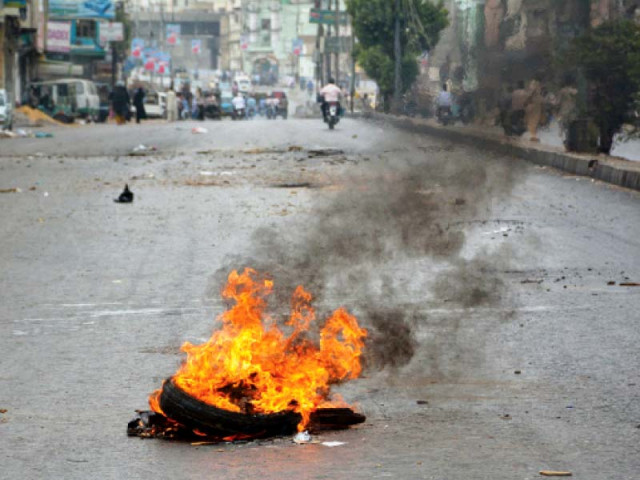First power, now water: The dark side of Karachi, the city of lights
Frequent power cuts at pumping stations have disturbed the water supply chain

Irked by the frequent power cuts, citizens in various areas of Karachi took to the streets on Monday to protest against the K-Electric, demanding it to ensure uninterrupted power supply at least during the month of Ramazan. PHOTO: RASHID AJMERI/EXPRESS
With over half the city plunged into darkness for the fourth time in one week, the K-Electric has seemingly failed the citizens of Karachi as far as the provision of electric power is concerned.
The latest breakdown on Sunday night affected a large part of the city, with power cut off in Malir, North Nazimabad, Gulshan-e-Maymar, Shah Faisal Colony, Water Pump, Gulistan-e-Jauhar, Gulshan-e-Iqbal, Korangi, Defence, Federal B Area, Manzoor Colony, Gulshan-e-Hadeed, Clifton, PECHS and Shadman Town.
While the residents of these areas grappled with the heat in the absence of fans and air-conditioners, there was another problem brewing —one that would haunt them in the next few hours. The Karachi Water and Sewage Board suspended the operations of Dhabeji, Pipri, Gharo, North East Karachi and Hub pumping stations, stopping the supply of water to major parts of the city.
Read: Karachi power failure: PPP to take up blackouts issue in parliament
The board's spokesperson, Nazeer Matin, reasoned that the frequent power cuts would cause the machinery to break down if it was kept running. "If the power at the Dhabeji pumping station is disturbed for one hour, the supply of water to the city is disturbed for 48 hours," he said.
His words seemed to ring true as on Monday morning, a 72-inch-wide water pipeline on the Dhabeji pumping station developed cracks, resulting in a shortfall of at least 200 million gallons per day (MGD) to the city. The pipeline developed cracks after an electricity failure at one of the board's pumping stations led to the water flowing back. Since the water pressure was too high, the old pipeline could not sustain it and developed cracks. According to Matin, the damaged pipeline would exert additional financial burden on the already struggling water board.
Read: Sleepless nights: Back-to-back blackouts trigger protests in Karachi
The rising temperature and increase in water consumption during the month of Ramazan has increased the demand for water manifold. Matin told The Express Tribune that Karachi's water requirement was 1,100 (MGD), while only 540 was available for the entire city. Water supply from the Hub Station has decreased from 100 MGD to 34 MGD because of the frequent disruption of power supply, he explained.
At around 3:45am on Sunday night, a major power outage occurred at the pumping stations due to which water supply was stopped to the entire city. The power supply resumed at 7:20am, after which the pumping of water was restarted. The three-hour power suspension caused a loss in supply of 128 million gallons of water from Dhabeji, 18 million gallons water from Pipri, 18 million gallons from North-East Karachi and eight million gallons from Hub, disturbing the water distribution in the city.
Read: Karachi heatwave: NEPRA faults K-Electric for deaths
For Matin, the frequent power cuts could create immense water scarcity in the city, with the distribution of water already disturbed in most parts.
"The water circulation could take four days to come back to normal because of the frequent power failures this past week," said Matin.
Speaking about a backup plan for the water distribution in the city, Matin said electricity was needed at any cost to pump water. He added that there was only one way to save water in this condition, and that is to use it carefully.
Read: Karachi hit by second blackout in five days
"Ramazan is a holy month and everyone needs water to perform religious obligations and for daily chores," he was quoted as saying in a press statement released by the water board. Zaidi also expressed concern over the frequent power cuts, and said that Karachi was already facing an acute water shortage and the power breakdowns were only adding to the citizens' woes.
Published in The Express Tribune, July 14th, 2015.



















COMMENTS
Comments are moderated and generally will be posted if they are on-topic and not abusive.
For more information, please see our Comments FAQ